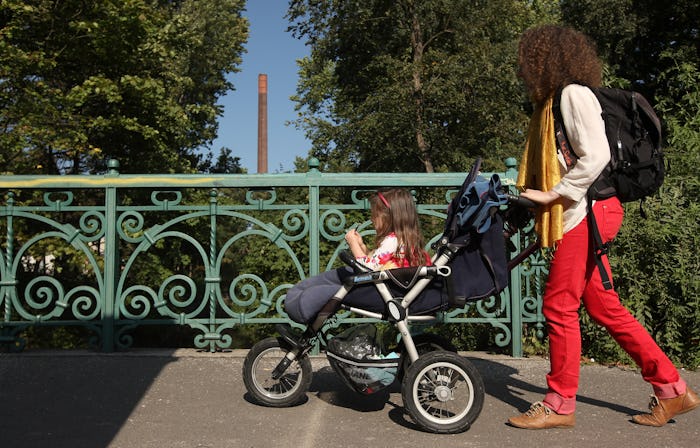Life

Women In Their 30s Are Having Kids More Than Younger Peers
According to a new report by the Centers for Disease Control and Prevention, more women in their 30s are having babies than women in their 20s. Much like delaying home ownership, more women (and their partners) are waiting until later in life to have children. This is a huge shift, since for the past three decades, women in their late 20s had the highest birth rates. Now, that's all changing dramatically.
According to the preliminary CDC data, the birth rate for women ages 30 to 34 was about 103 per 100,000, while the rate for women ages 25 to 29 was 102 per 100,000. It's a slight difference, but it's becoming more common to see older parents with children in elementary school. In addition to women waiting longer before having children, the CDC also found that the rate of teen pregnancy nationwide is down.
Both of these rate drops can be attributed to different kinds of stigma. On one side of the equation, more teens are growing up seeing fewer of their peers have babies, and so it becomes a matter of course that they're taking precautions to not get pregnant. On the other, it's becoming way less taboo for older women to have children.
But you know who the real winner is here? Access to birth control and family planning, so women can choose when to have children, if at all.
The CDC hasn't said so in a statement or anything, but other studies show that access to affordable birth control lowers the rates of teen pregnancies nationwide. In fact, in places with fewer Planned Parenthoods — which provide not just affordable care but anonymity for teens — the teen birth rate is higher. Likewise, women in their early twenties, instead of having children, are pursuing higher education, graduate degrees, careers, and their own personal relationships, and subsequently waiting to have children when it makes sense for them. It's a good thing.
The average age at which women have children is 28 years old, according to the new CDC report. Fifteen years ago, the average was 24. In 2014, it was 26. So this is a steady, consistent increase in the age of new mothers. If women and their partners are waiting to have children, they're likely planned (or semi-planned) pregnancies, which means that families are more prepared to take on the financial burden of growing their families, and that women might have hit a certain income bracket and career milestones before taking the plunge.
Some health officials worry that women waiting longer to have baby number one could translate to an increase in more dangerous pregnancies the second or third time around. But 28 years old is hardly ancient; It's not until around 35 years old that women should start really thinking about their fertility. (Most research shows that women are worrying about their fertility way too early anyway. So let women live.)
Long story short, women young and old are making choices on their own and more are choosing to delay having a baby until they've got life a bit more figured out. And that's never a bad thing.